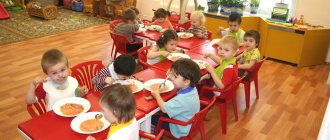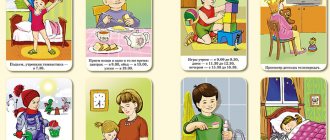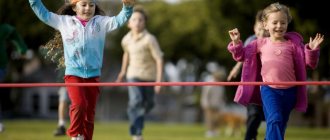Doctors, psychologists, and teachers talk about the benefits of the regime for both children and adults. Our physical health, psychological and emotional status depend on diet, sleep and rest. And if we are talking about a child, then the regime is also the basis of proper upbringing.
It turns out that for a preschool child, the concept of regime is a daily routine, which includes the routine of sleep, nutrition, activities and rest, games and walks. Parents of children 5-7 years old who attend preschool think less about the routine. But parents of preschoolers who do not attend kindergarten and follow a home regime have more questions.
Why do we need a regime?
In a situation where there is no regime, the child may experience:
- hyperactivity
- hyperexcitability
- memory impairment
- decreased performance
- fast fatiguability
- frequent respiratory diseases
Why is this happening? The daily routine for a baby is not only a convenience for the parent or an adult whim that encourages the child to accustom himself to a strict daily routine. The habitual regime reinforces the formation of biorhythms and conditioned reflexes, preparing the body to perform habitual functions, such as sleep, eating, mental activity, and rest.
In addition, adherence to the regime has a positive effect on physical health, as the regime strengthens the immune system. In preschool institutions, the daily routine is strictly observed. But when bringing a preschooler home, parents do not always adhere to the routine, forgetting to put the baby to bed on time in the flow of evening worries, which leads to lack of sleep and, consequently, problems with waking up in the morning.
Find out your child's level of preparation for school
Tips for organizing a child's daily routine
Here are some of the recommendations that are important to follow for the health and full development of the child:
- Wake up earlier (recommended wake-up time for preschool children is 7.30);
- Balance the diet (eating by the hour, completely eliminating sweet and starchy snacks);
- Organize walks at the same time (at least 1.5 hours, depending on weather conditions);
- Intellectual loads should be given mainly in the first half of the day;
- Do not forget about daytime sleep, which should last 1.5 - 2 hours a day. A full day's sleep, as well as a night's sleep, is important in the development of preschool children; at this time, the nervous system is unloaded, as well as the assimilation of information received during the day. At the same time, do not put your child to bed after 15.00 - otherwise he will fall asleep late at night (6 hours is enough for play and preparation for proper rest).
Plan to enjoy your day! “Laziness - mother does not sleep!”
If you liked the article, please share a link to it
ABC of the regime
There are rules in all areas of our lives, and they also exist in observing the regime. As we said above, there is a diet for preschoolers, physical activity, sleep, games, and activities.
Diet. If we are talking about proper nutrition, then the regime is most accurately followed in preschool institutions, so it is worth focusing specifically on the organization of nutrition in kindergarten:
- at least 4 times a day;
- a hot meal at least 3 times a day;
- according to daily caloric needs: breakfast 25%, lunch 40%, afternoon snack 15%, dinner 20%;
- according to the daily calorie intake: 5 years - 2000 kcal, 6 years - 2200 kcal, 7 years - 2400 kcal;
- by quantity - you should not give a portion larger than the child usually eats (it is better to add a supplement).
The menu should include meat and dairy products, bread, vegetables and fruits every day.
In terms of time, the mode is built like this:
- breakfast at 8-9 o'clock,
- lunch at 12-13 o'clock,
- afternoon tea at 15-16 hours,
- dinner at 18:30-19:30 hours.
Meal times should be the same on weekdays and weekends.
It is advisable that the last meal be an hour and a half before bedtime.
Mode of physical activity and rest. Every day a child makes many movements, so physical activity means not only physical education, but also active games, sports, movement and relaxation. And here, too, there is a regime that ensures proper physical development.
- The peak of physical activity should occur in the first half of the day.
- Weekly physical activity for children 5-7 years old is 6-8 hours per week, according to SanPiN.
- Morning exercises are required.
- Physical education classes in a preschool institution - 3 times a week: children 5 years old - 25 minutes, children 6-7 years old - 30 minutes.
- Outdoor active games while walking (in bad weather they are replaced by a full set of exercises indoors).
- Physical education minutes between mental activities.
- Exercising after a nap.
- Moderately active games on the second walk.
Moderate physical activity should be observed immediately before breakfast, before mental activities and in the evening before bed.
Sleeping mode. A proper sleep schedule helps restore your baby's mental and physical strength that was spent on the active part of his day. Not only his psycho-emotional state, but also his physical health depends on how a child’s sleep is organized. Healthy sleep means strong immunity. And now, in order.
- Sleep duration for preschoolers: 5-6 years old - 12 hours, 7 years old - 10-11 hours. But much is individual - depending on temperament and workload, the required time for sleep may increase.
- Morning awakening should occur at 7:00-8:00, it depends on biorhythms and family habits, but you should not wake up later.
- Daytime sleep in children 5-6 years old lasts 1-1.5 hours. At 7 years old, a baby may refuse to sleep, but active children need about 1 hour of sleep.
- Evening bedtime depends on the presence of additional physical or emotional stress. It is recommended that children aged 5-6 years go to bed at 20:30 - 21:00. At 7 years old it is possible to shift the time of falling asleep by half an hour.
Mode of exercise (mental activity) . Both kindergarteners and children who do not attend kindergarten are not deprived of developmental activities in preschool age. But like any other activity, the time and number of classes must be correctly distributed and systematized. In other words, the home regime should not differ much from the regime in preschool institutions. The organization of classes in the general daily routine is as follows:
In the morning after breakfast - two or three multidirectional classes. Duration of classes according to age: 4-5 years - 20-25 minutes per type; 6-7 years - 30-35 minutes.
If the walk is cancelled, you can add another creative activity or educational game.
Approximate daily routine in a preschool institution
| Time | Activity |
| 7.00- 8.00 | Reception of children. |
| 8.00- 8.20 | Morning exercises. |
| 8.25- 8.55 | Preparing for breakfast. Breakfast |
| 8.55- 10.00 | Preparation for classes. Organized focus: speech and physical development, artistic and aesthetic, cognitive, including FEMP (formation of elementary mathematical classes). Social, communicative and musical. |
| 10.00- 10.15 | Lunch. |
| 10.15- 10.45 | Independent studies. |
| 10.45- 12.05 | Preparing for a walk. Walk. |
| 12.15- 12.55 | Preparing for lunch. Eating. |
| 13.00-15.00 | Daytime sleep. |
| 15.00- 15.15 | Gradual rise. Gymnastics after sleep. |
| 15.20-15.55 | Afternoon snack. |
| 16.00-17.00 | Independent activity of children and adults. Preparing for an evening walk. |
| 17.00- 18.00 | An evening walk. |
| 18.00- 19.00 | Dinner. Independent activity. Going home. |
Have you ever wondered why preschoolers’ day is structured this way? Why are the first half of the training sessions provided for by the program in which the child is developing? Why is there such a time interval between meals?
Scientists in the field of childhood development have observed and found that it is during this period of time that food is better absorbed in the child’s body, releasing more useful substances. This has a beneficial effect on both digestion, without overloading the stomach with snacks, and on the development of the child’s brain activity.
The hourly period from 9.00 to 12.00 is a “cheerful” time for assimilation of information. In the first half of the day, children's brains do not sleep - they work, absorb new knowledge. With irregular intellectual stress, the nervous system and psychological state are in a relaxed state, which leads to low academic performance, passive physical development, and this is a consequence of a decrease in the body’s functioning, including against viral diseases. Children who strictly follow a daily routine, are organized, independent, inquisitive and intellectually developed.
In combination, daily routine + mental stress + physical focus = strengthening the nervous system, immunity, general development.
If a child often stays at home or does not attend kindergarten, it is recommended to carefully approach his all-round development. It is necessary to divide the day into energetic and passive parts according to age and psychological characteristics.
Lesson notes on OBP “What is the daily routine?”
Circle:Each child has a flower in his hands. The teacher passes the flower with a wish to the child, and he passes it to the next one; the bouquet gradually increases, and a whole bouquet is returned to the teacher - a bouquet of wishes. Wish health, wish goodness to others, and it will definitely come back to you!
Conversation:
Nature has its own mode of life, its own laws of life. Nature maintains a certain order in its life, and this order is called “Seasons”. List them.
Man is a piece of nature, and he must maintain order in his life, must lead a certain, correct way of life. The order in which a person lives is called “daily routine”. It is observed by both adults and children, especially those who want to grow up healthy. Today we will play a game - the journey “Daily Mode”. And what is it?
- That's right, this is a daily and life routine that helps us do everything on time: study, play, walk, and relax. It saves us from fatigue and overload, strengthens our health. Get in the column! Let's go on a train journey.
A steam locomotive has been waiting for us for a long time - Two pipes and a hundred wheels.
Steam locomotive, steam locomotive - he carried the carriages.
Station 1 “ The morning begins - the sun wakes up”
-To wake up in a good mood, you need to go to bed on time. When we wake up in the morning, what do we do?
-Do you know how to wake up correctly?
1. Stretch 2. Place your right leg and stand 3. Smile
-Why do you think I should smile?
Musical game " Stretch"
-What do we do next? That's right, let's wash ourselves. I'll check now, do you know what supplies are needed for morning toilet?
Game
“Find and Show”
- Well done, washed your face! I hear the porridge puffing on the stove.
Breathing exercises “Porridge”
IP: sitting, one hand lies on the stomach, the other on the chest. Drawing in your stomach and drawing air into your lungs - inhale, lowering your chest (exhaling air) and sticking out your stomach - exhale. When exhaling, pronounce the sound “f-f-f-f” loudly. Repeat 3-4 times.
Station 2: “ Healthy eating – great mood”
-We have arrived at the next station and will stay there for a bit and play.
Relay game “ Healthy food”
Station 3: Dienesh blocks d/i " Architects"
-We had breakfast and arrived at the Shkolnaya station. What do you do in class at school? That's right: you draw, count, sculpt, and learn a lot of new and interesting things. You and I are architects, we will build a house according to the plan.
—So we played and went for a walk.
Guys, lunch is waiting for us - both compote and vinaigrette!
p/game “ Vegetables and fruits”
Place two pans in two hoops: “Vinaigrette” and “Compote”. Lays out pictures depicting various products.
Station 4 " Quiet hour"
-And now we’ll go to bed, Let’s breathe through our noses.
- Guys, what do you think, do animals sleep? Do they need sleep? For what? Do you know how animals sleep? Is everything the same? Let's look at the photos.
Giraffe Owl Squirrel Horses Birds Puppies
- Well, guys, wake up and toughen up quickly!
-After sleep, we relax and play different games!
p/game " Two Circles"
(To the music, they run scattered through the group. When the music stops, line up in 2 circles)
After school, the children go home, play, and do their homework. Let's remember the familiar letters and write them on the board.
Lacing game
In the evening we go home, have a light dinner before bed.
We take a bath and put on pajamas.
Night covers the earth - the son and daughter fall asleep.
-What do you think, is everyone’s sleep duration the same?
-Some animals, such as marmots and bears, hibernate in order to accumulate more energy for an active life, which they will begin with the arrival of spring. And with the arrival of winter, squirrels sleep more than at other times of the year. Does a person need sleep? For what?
-Remember how you felt when you didn’t sleep well at night? Those people who get a good night's sleep live longer than those who are constantly sleep deprived. During sleep, children's bones also rest, thanks to this, they grow better. It’s not for nothing that they say that children grow up in their sleep.
-Do adults and children sleep at the same time? Who can say how long very little ones ( infants)
children? But in order for the sleep to be complete, you need to follow certain rules.
Psycho-gymnastics
“Dream”
A dream comes to visit us. He calls you to his bed.
Sleep, baby, it’s sweet, sweet, Everyone sleeps at night, even during the day.
We'll rest a little. We were too tired after half a day,
We need to take a break.
Result:
Now please sit down at the tables and draw your best dream. And then you tell everyone about your dream. Our Daily Routine journey has come to an end. I wish you to always be cheerful and healthy. Praises children.
Additional classes, sections and clubs
When creating your child’s daily routine further, feel free to include in the remaining time those sections and circles that you have chosen together with your child. In this matter, the main thing is not to overload the child; it would be better to have 2-3 sections, but visiting them will truly become an enjoyable time for the preschooler.
Read our article: Where to direct your child’s energy - choosing clubs and sections for children
At home, parents can also independently study with their child using special manuals that will help instill in their child basic knowledge of mathematics, the world around them, and tell them how to teach their child to read and write. Also keep in mind that the optimal time during which a 5-7 year old child can concentrate is 20-40 minutes, after which he needs to switch to vigorous activity.






